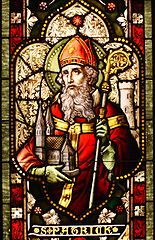
The Life And Writings Of Saint Patrick -Saint Patrick
X.—PATRICK AT PALLAS GREEN
Not getting then the site of his church and cloister from Colman at Clar, Patrick sought it elsewhere, and went west of Cullen to Grian in Arada Cliach, but still within the same district. Now Dola, the owner, opposed them there, and would give Patrick no place for a church, whereupon Patrick said that he himself would have no home there, or at best it would be a poor one; that its people would be only two or three, ‘and even these will be slaves, and of a lowly race, and the rest will migrate from it’—which they did to the neighbouring territory of eastern Cliach, and ‘they are called Dal-mo-Dola to the present day.’ It is not easy to say whether it was those who migrated, or those who stayed that have given their name to the parish of Oola, near the junction, but in any case it is only a very small town, and quite unknown to fame.
Patrick was angry at this reception, and when a certain Nena went to him, he refused to see him, saying, ‘of Nena will be nothing’—with a neat play on the Irish words, Nipa ni Nena—which was verified; for his descendants were slaves with their kindred in Muskerry Mitine, in the west of Cork. It is probable they were driven out by the Eoghanachts of Eastern Ara Cliach. They are called the Menraighe.
But although the head men of Pallas Green received Patrick so badly, their wives were not of the same spirit, and they bewailed the Saint’s departure without, so far as we can judge, founding a church, or leaving them a blessing. Then Patrick was softened, and blessed the womenfolk, and he said moreover that their children begotten ‘of foreign husbands would be dignified;’ but it is implied that the offspring of the native men would be contemptible and under a ban. It is not safe for anyone to oppose the progress of the Gospel.
Then going a little to the South, Patrick came to Kilteely—so called from the hill Tedel, which was also in Arada Cliach. When he was leaving this place—bidding them farewell—two youths of his family remained behind, it seems on purpose, for they were found sleeping in a brake. “Here will be their resurrection,” said Patrick, ‘and so it came to pass. They died soon afterwards, and were buried in the church of Kilteely, which belongs to Patrick’—doubtless because he, or some of his household, founded it. On the whole, the people of Arada Cliach around Emly, treated Patrick shabbily. Perhaps they had some secret dislike to the foreign Bishop, who came amongst them claiming to be superior even to their own kinsman, Ailbe (of Emly). No word, however, is said of the See of Emly here, for it was not yet founded by St. Ailbe, although on this journey, as we have seen, he recognised the primacy of Patrick, and made formal submission to him. Patrick, on his part, if we can credit the Life of St. Ailbe, or rather of St. Declan, recognised Ailbe as ‘Archbishop’ of Munster, in an informal sense, however, just as Fiacc was recognised as ‘Archbishop’ of the men of Leinster. We have referred to this subject elsewhere, and declared our opinion that Ailbe was preaching in Munster before the advent of St. Patrick, with, however, only very partial success. It would appear, too, from this narrative in the Tripartite that the people of this district did not receive St. Patrick well; and this only goes to confirm what we have said, that having already a Bishop of their own, they were not anxious to receive the Saint amongst them. Ailbe himself, however, knew better, and recognising the apostolic authority and missionary success of Patrick, yielded him due obedience, and was by Patrick canonically constituted chief Bishop of East Munster.

 Keep Site Running
Keep Site Running